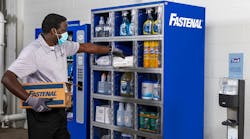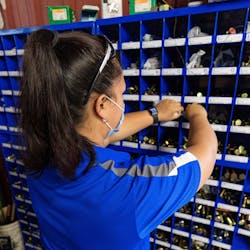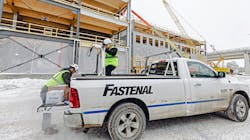Fastenal Company
Hardware retailer
Winona, MN
13,609 employees | 2,827 sites | 28 EHS professionals
Fastenal Company developed a program that doesn’t just encourage near miss reporting, it rewards it.
Starting on Day 1, all new employees are instructed on the company’s near miss program. When near misses are reported, the safety team takes immediate action to make sure everyone is OK and no further hazards are present. Then, they retrain employees who were involved and assign corrective actions to prevent another near miss.
“That’s what providing a safety workplace for employees is all about,” says EHS & Sustainability Director Dave Olson. “We make sure hazards are eliminated, substituted or controlled so we continuously improve.”
Fastenal randomly selects three submissions each month and rewards those employees with gift cards and safety logo apparel to encourage reporting. It’s working. In 2020, Fastenal had 119 near misses from one location with a FTE of 124. This year, the company is on track to have 139 near misses.
In addition, Fastenal distributes a monthly near miss newsletter detailing each incident with employees. High-risk near misses are also shared monthly with leadership and safety committee members.
To be considered for an America's Safest Companies award, organizations must demonstrate excellence in several areas: support from leadership and management for EHS efforts; employee involvement in the EHS process; innovative solutions to safety challenges; injury and illness rates lower than the average for their industries; comprehensive training programs; evidence that prevention of incidents is the cornerstone of the safety process; good communication about the value of safety; and a way to substantiate the benefits of the safety process.
The full list of America's Safest Companies of 2021 can be found here.
This kind of proactive action isn’t unusual for Fastenal; the company has a track record of using data to develop needed safety training programs.
“Like most companies, we spend much of our limited resources on areas that present the most risk or produce the most incidents,” Olson says. “However, we work diligently to qualify the problem or risk.”
For example, Fastenal recently implemented a 90-day new employee check-in. Despite a robust onboarding program, the company noticed that about 30% of incidents—representing much of employees’ day-to-day exposure such as ergonomics—were consistently among new employees within the first year, on average within 120 days. In response, Fastenal developed an interactive program to engage new hires on the most frequent job hazards at 90 days. The number of incidents among employees hired within the first year has fallen by nearly 40%.
These programs are in addition to regular inspections, assessments, trainings, meetings and coaching programs. It’s no small feat for a Fortune 500 company (No. 489) that services a variety of industries, either at stores available to the public or onsite at customer locations.
When COVID-19 struck, Fastenal had to pivot to make sure store shelves and vending machines were still stocked while keeping its workers safe. As a distributor, 98% of employees had to work on-site throughout the pandemic to support critical customers such as hospitals, first responders and manufacturers.
That commitment to safety included becoming one of 50 global organizations of the ISO 45001/TC 283’s occupational health and safety management technical committee last November to help establish worldwide guidance on COVID-19-related practices and protocols.
“We believe that safety is a value at our organization, and we strive to be a beacon for employee safety throughout the world.”



